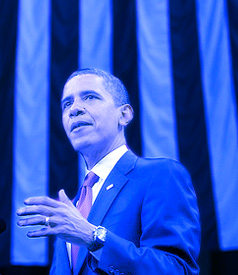Did you know that Truthout is a nonprofit and independently funded by readers like you? If you value what we do, please support our work with a donation.
We live in the era of hype. The word, which bounces and bounds throughout the matrices of our information age, refers to a cultural product that has been so juiced up with marketing that its popularity takes off independently and regardless of its quality. It is the wrapping that matters: the advertisement is louder, more important and more real than what is advertised. James Cameron is the author of the latest, greatest global hype: “Avatar.” The force behind the bludgeoning impact of “Avatar’s” promotional blitz has been driven by three main factoids: it’s the most expensive movie in the history of movies, it has revolutionized the world of special effects and it was shot in 3-D. Nothing about the intricacy of the plot or the depth of the characters, the substance of “Avatar,” as presented to us through its marketing managers, is the shine of it surface. French philosophers Deleuze and Guattari write that the meaning of a cultural good always exists in the connections that it establishes with its external image. With this in mind, “Avatar” can be looked upon not only as a movie, but as a metaphor for an entire country: the United States has become the greatest hype on the face of the earth.
In 1992, Neal Stephenson popularized the concept of a metaphorical avatar with his cyberpunk novel “Snow Crash.” In Stephenson’s world, an avatar is a digital image that stands in for a real person in virtual domains, such as the Internet, video games or role-playing games. To this list of irreal dimensions, we can add the world of American politics. During the first year of the Obama administration, it has become apparent that it wasn’t actually Barack Obama himself that participated in the elections: it was, rather, his avatar out there on the campaign trail. Pierre Levy explains in one of his books that “the virtual” never opposes “the real,” but only “the actual.” Using this paradigm, one could say that politicians do in fact exist in reality and make promises in that realm, but these promises are hardly ever actualized; they are hardly ever kept. Not one of the major promises with which Barack Obama won the hearts, the votes and the hopes of the American people has been fulfilled: he has done almost nothing that his avatar said he would do. Avatar Obama is an immense hype, the product of a tremendous marketing campaign that has turned a real person into a symbolic shell. Avatar Obama is billboard and wrapping: pure brand name.
One of the recurring themes in America’s mythological self-perception is the notion that the United States was chosen by God to serve as a guide for all the other nations in the world. Avatar Obama recently drew inspiration from this meme during the ceremony in which he was awarded the Nobel Peace Prize. In spite of its disintegrating capacity to serve as the leader of the world – a failure that, against the backdrop of a rising China, is evidenced by and embodied in the United States’ economic dependency and its inability to get a handle on the Middle East – Washington continues to intoxicate America’s collective imagination with the semantics of superpowerism. This grand and noble portrayal of the United States, however, has become nothing more than a figment. A giant, swiftly unraveling hype. Avatar America is a sign that is independent of and disconnected from what it is supposed to signify, the irreal meaning of which can only be glimpsed through a suspension of reality and a leap of faith. Perhaps it is not by coincidence, then, that the storefront of Macy’s in New York City has for weeks now been dominated by an enormous neon sign that reads: “Believe!”
A few months ago, “The Daily Show” ran a special on the 20th anniversary of the fall of the Berlin Wall. During the episode, the crew waxed ironic on the two unique and unrepeatable conditions that brought about the collapse of the Soviet empire: a war in Afghanistan and a disastrous economic situation. When Jon Stewart, the show’s host, fretfully noted the uncanny resemblance between the Soviet scenario and the current US predicament, one of his correspondents tried to offer him some satirical reassurance by stating that, in reality, the USSR’s main problem was that it was, at the time, headed by an inexperienced leader who was ushered into power promising sweeping reforms for the country. This is a good point, but the correspondent forgot to mention that, five years into his post, that same Soviet leader was awarded the Nobel Peace Prize. Perhaps, it is no comfort to Stewart that Obama got his Nobel in just one year.
Translation: Willow Schenwar.
Willow Schenwar is a writer and editor based in Chicago. Her essays and book reviews have appeared in The Philadelphia Inquirer, Z Magazine and Religion Dispatches.
Media that fights fascism
Truthout is funded almost entirely by readers — that’s why we can speak truth to power and cut against the mainstream narrative. But independent journalists at Truthout face mounting political repression under Trump.
We rely on your support to survive McCarthyist censorship. Please make a tax-deductible one-time or monthly donation.
